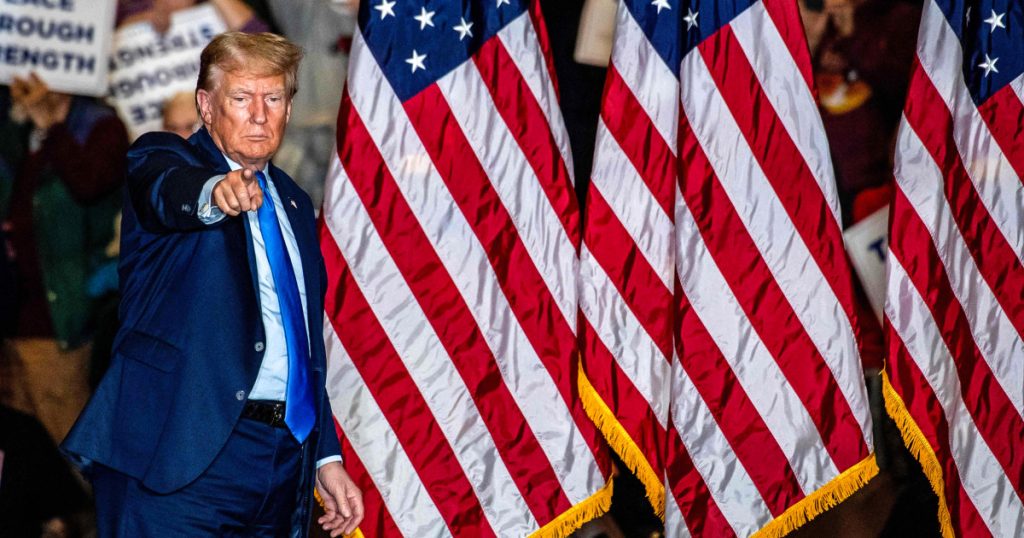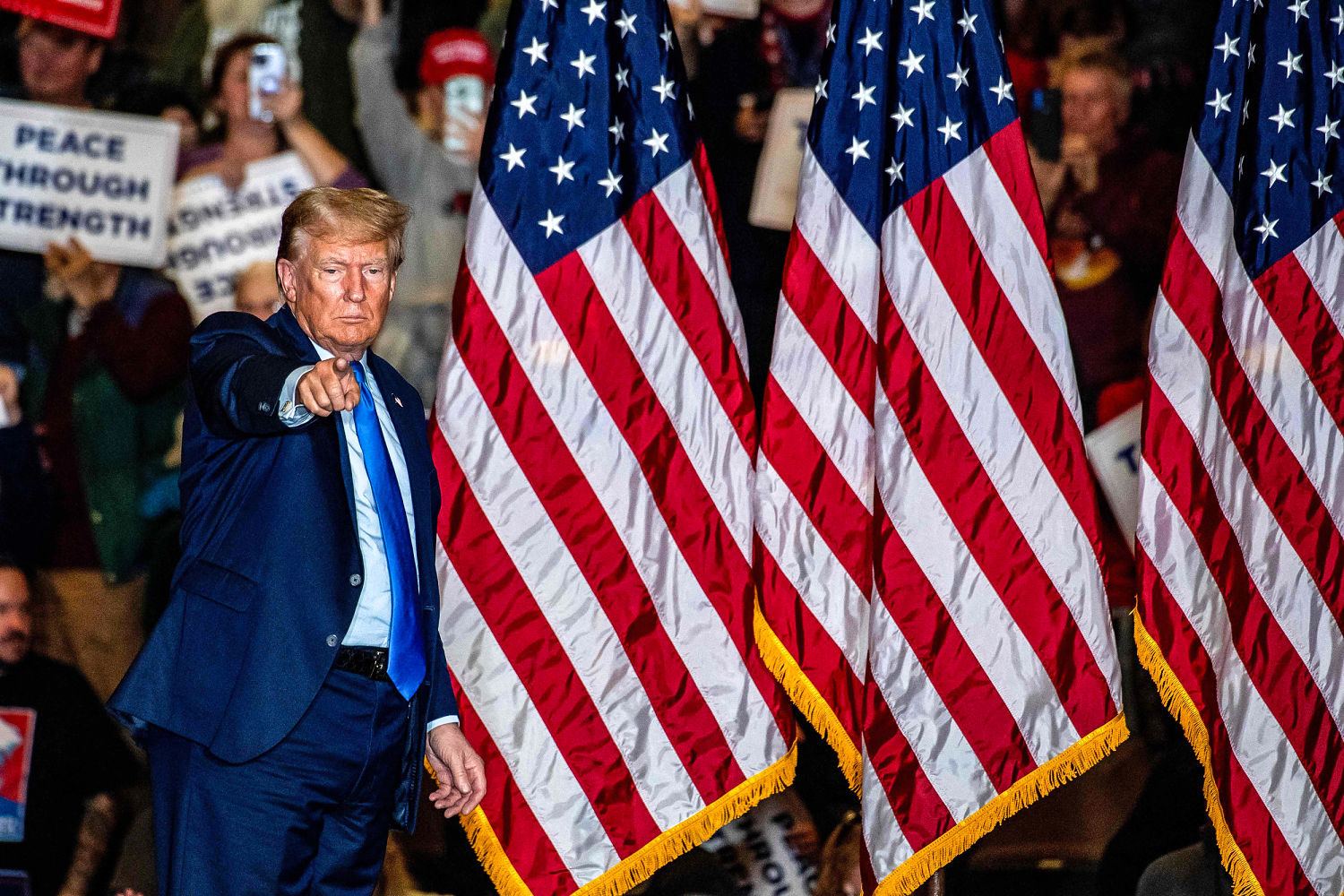

One of the hallmark answers of the confident Democratic strategist about 2024 usually includes some combination of the following: Joe Biden will win thanks to abortion, concerns over democracy and worries about GOP extremism.
Ask Republican strategists what gives them confidence about winning in 2024, and I usually get answers that include the phrase “radical left” or the word “socialism” — and the belief that they will turn off enough swing voters to help Donald Trump.
But here’s the thing: One person’s “extremist” is another person’s “passionate advocate,” and one person’s “radical” is simply another person’s brother in arms.
All of this stems from surprising poll results from a Democratic outside group called Blueprint, which bills itself as “a new public opinion research initiative designed to study the most crucial voting groups and which policies and messages are breaking through and resonating with them.” The short version: It’s a Democratic polling initiative trying to nudge Biden’s campaign and Democrats as a whole to come up with better messaging to swing voters.
There are a few key takeaways from Blueprint’s initial survey of voter perceptions of Biden, Trump and their accomplishments and promises. The biggest one Blueprint wants the White House to know is that “Bidenomics,” as it’s currently viewed, isn’t a net positive for the president. Its polling shows voters are judging the economy on the price of goods, not whether they have good jobs.
Biden and his White House advisers have never faced an economic climate in which jobs were plentiful but prices were high. They’ve spent the better part of 30 years believing the best economic message is a jobs message. But that has changed, thanks to the unique circumstances of our pandemic-recovering economy, and Democrats are struggling to accept the premise that a low unemployment rate isn’t being viewed as the No. 1 way to judge the country’s economic conditions.
In addition, the group noted, voters had heard more about Biden’s more “progressive” accomplishments (or attempted progressive actions, like canceling federal student loan debt) than his more moderate ones, like opening up more oil and gas permitting. In case you’re wondering, swing voters like the energy initiatives more than student debt relief.
I believe this finding is a function of two things: Both liberal media and conservative pro-Trump media want to tout the progressive items. Neither liberal media nor conservative media wants to trumpet the idea, either, that the other side has mainstream accomplishments — or, in the case of the former, accept the premise that there are centrist ideas more popular than progressive ones.
But it was Blueprint’s final big takeaway that really catches the eye: Voters believe Biden and the Democratic Party to be as extreme as Trump and the GOP.
It’s a finding that will send those who live in a blue bubble into disbelief, while folks who live in a red bubble are wondering why voters don’t think the Democrats are more extreme. But in purple America, this is a reminder that the principles of physics apply to political polarization. For every harsh, over-the-top rhetorical attack, there’s an equally harsh rhetorical retort that will seem just as believable to the less partisan eye.
And that appears to be the vocabulary standoff the two sides find themselves in right now. Each side is desperate to brand the other as extremely out of touch with the mainstream. And both parties have succeeded.
Just 28% of those surveyed by Blueprint say Biden’s ideology is “close” to their views, while 43% consider Biden “far more liberal than me.” For Trump, the numbers are 32% of voters who say he’s “close” to their views, versus 41% who describe him as “far more conservative than me.”
Neither side may accept this reality from voters, and I’m sure I will get some passionate emails explaining to me why side A is truly an extremist and side B is simply responding to this current moment of crisis. But it doesn’t change the perception going into 2024.
The political world has diluted the meanings of words and phrases so effectively (and, in some cases, done a full gaslight on phrases like “fake news”) that it has blunted the impact of some words compared to even 10 years ago. Both “extreme” and “radical” could have an impact in both parties back in 2012 (without getting overly used). But not anymore.
Part of that phenomenon comes from the ridiculous rhetoric that is commonplace in fundraising emails. Obviously, the assumption is that only the most passionate supporters of the Red Team or the Blue Team are meant to be activated by fundraising email rhetoric.
But the absurd rhetoric borders on insulting one’s intelligence. The idea that they are tracking donations and noticed yours was missing is ridiculous. So is the idea that a small donation now will have an impact the campaign will notice. It’s the worst type of cable TV hype marketing, and it has become a mainstay of political fundraising rhetoric.
But it isn’t just fundraising rhetoric that has rendered some words less meaningful — there’s also social media. You don’t need me to find explicit examples of over-the-top rhetoric from the accounts of so-called mainstream politicians. Simply open X and search political accounts.
This is an important insight as strategists decide how to prosecute this campaign in 2024. In 2018 and 2020, Democrats could build a larger anti-Trump coalition effectively using extremism as an organizing tool. But a few things appear to have happened in the last two years. For one thing, Trump has been co-opting extremism rhetoric with his voters, doing his best to project it back on the left. In some ways, the right’s “own the libs” mindset allows it to feel like a badge of honor when the left or someone in the dispassionate middle refers to it as extremist. Many Trumpers embrace the word “radical” as a way of defanging the term.
There has also been the deplatforming of Trump on mainstream social media sites for much of the last three years. It shielded people who don’t follow politics day to day from Trump’s increasingly disturbing rhetoric. If a rhetorical bomb, like threatening to lock up government workers, falls in a Truth Social forest but no one in the mainstream is there to hear about it, did it make an impact?
Nothing about this means Trump isn’t out of the mainstream on a lot of issues compared to where Republicans have been for decades, but this poll is a reminder that the public doesn’t necessarily see the words “extreme” and “mainstream” as describing the same ideas the same ways.
The point the Blueprint pollsters are making is that wooing swing voters is about meeting them where they are, not telling them what they should think. Really running against Trump means running against his ideas and proposals specifically, versus trying to label it all as “extreme.”
Many voters want the bull-in-the-china-shop approach to politics right now. But the more general — and less specific — one sounds in trying to paint the other side as “extreme,” the more the swing voter is going to dismiss that rhetoric.
I do think the eventual winner of this election’s swing voters will be the candidate and party that convinces these voters they will heal the country, not divide us more. The harsher one sounds about the current state of our politics, the more it could turn off the very voters needed to win in this polarized climate.
What’s playing on campaign TV
About that fundraising-style rhetoric: It has now crept into TV ads. Check out this opener from GOP Sen. Rick Scott of Florida. It’s filled with over-the-top rhetoric that isn’t believable to anyone of rational thought but sounds good to those on the passionate right.
“Crime is rampant and goes unpunished. Our border is wide open,” Scott begins in the ad, reeling off a litany of other complaints about the state of the nation, from foreign policy to the national debt and beyond.
If you want to bring the country together, claiming crime goes unpunished (it doesn’t) or that the border is wide open (it isn’t) doesn’t exactly win over hearts and minds. Of course, nothing about this spot is about bringing the country together.
This is the language that has become more mainstream, and ironically, no one using it would talk like this in a board room or at a PTA meeting or in their own home. I’m not fully convinced this tone of TV ad is a good one for a Senate race, but if you are seeking to become a leader of the Trump-led conservative movement, then this rhetoric may make sense. Perhaps this is his way of running to be the next Senate majority leader.
Remaking ‘America the Beautiful’
This was a striking climate change spot from Democratic Maryland Senate candidate David Trone:
Changing the words of “America the Beautiful” might have been considered risky in another time, but not today. Trone is running in a tough primary to succeed retiring Sen. Ben Cardin. His chief primary opponent is Angela Alsobrooks, the popular Prince George’s County executive. This is going to be a very divisive and expensive primary between a self-funder in Trone and a candidate in Alsobrooks who is winning more early endorsements so far. This means Trone needs to stick out as early and as often as he can. Creating sticky TV ads like this one is a way to make some inroads.
A Republican message on life that doesn’t mention abortion
As you can probably tell, I love perusing political TV ads. There’s so much that can be gleaned from a TV ad, from which voters candidates want to target to what issues they think will resonate. With Republicans struggling to message to both their base anti-abortion activist voters and swing voters, I found this one to be among the most compelling.
It’s from Eric Doden, a former president of the Indiana Economic Forum. He’s an underdog in a crowded primary for Indiana governor that also features conservative Republican Sen. Mike Braun. Standing out as a conservative in a GOP primary in Indiana isn’t easy. But check out this ad, which hints at the abortion issue without actually saying the word.
“Thirteen thousand. That’s the number of children in foster care in Indiana. They’re among our most vulnerable citizens, and they deserve to be in permanent loving homes,” Doden’s wife says in the ad. “My husband, Eric Doden, is determined to help them and support the families who step up to provide those homes. Eric’s zero-cost adoption policy would be the first in the nation.”
I’ve heard plenty of Republicans recently admit they need to act out their longtime “pro-life” slogan beyond abortion, not just worry about a life before a person is born. This is one of the few recent examples I’ve seen in which a candidate is trying to put his money where that rhetoric takes him. Let’s see if voters respond.

 Latest Breaking News Online News Portal
Latest Breaking News Online News Portal




